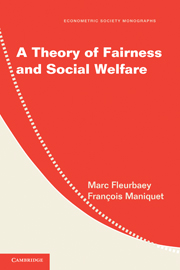8 - Public Goods
Published online by Cambridge University Press: 05 January 2013
Summary
INTRODUCTION
Assume agents share a technology. The technology can be used to transform quantities of a private good that is currently owned by the agents into a public good (that is, the consumption of the good is nonrival: think of a software jointly developed by several firms, a public facility produced by members of a community, transportation infrastructures, and the like). How much should each agent be asked to contribute to the production, and how much should be produced? Also, assuming it is possible to exclude some agents from the consumption of the public good (think of hours of TV programs, or access to a public facility), should that possibility be used, and if so, how much of the public good should each agent be allowed to consume? These are the questions we raise in this chapter.
Even if the model we study here remains simple (there is one private good and one public good), the new ingredient we introduce – that is, the production technology – will turn out to sufficiently enrich the model to enable us to study new fairness properties.
Two axioms are introduced. The first one is based on the comparison of what an agent gets and what the agent would get if he or she were alone in the economy, and could use the production technology by himself or herself. When the good to produce is a public good, being alone in the economy is a bad situation – actually, the worst situation one can think of.
- Type
- Chapter
- Information
- A Theory of Fairness and Social Welfare , pp. 135 - 165Publisher: Cambridge University PressPrint publication year: 2011



